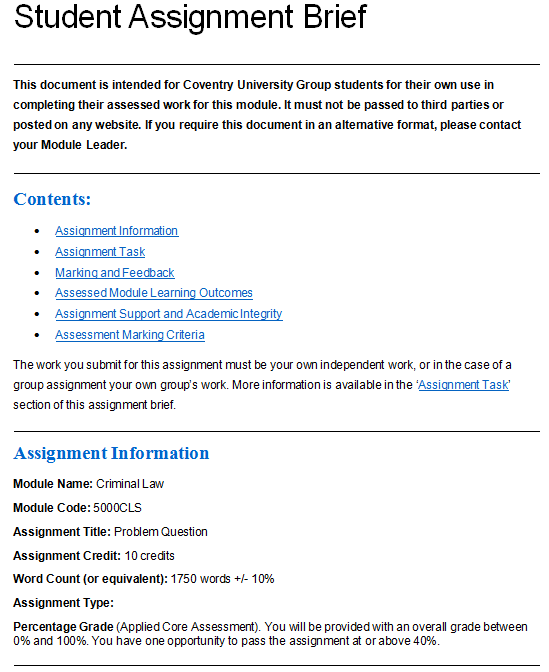5000CLS Criminal Law CW2 Assignment Brief | Coventry University

5000CLS Assignment Task
The following is a problem question, which requires you to apply the law to the facts of the scenario to determine potential criminal liability. In doing so, you should consider one relevant offence or defence at a time and, within that, one element of that offence or defence at a time, using legal authorities for each element and identifying particular facts within the scenario to demonstrate proof of that element.
Rick is visiting his friend Morty who is in hospital. During his visit, Morty needs some medication and Rick has to leave the room for 20 minutes whilst this is administered. He walks off down the corridor and notices a doctor’s white coat on the back of a chair in an empty room. Rick (who has always wanted to be a doctor) goes in, puts on the coat and walks out of the room wearing it. He realises that there is a watch in the coat pocket, decides to keep it and puts it on his wrist. In the room at the end of the corridor, he sees Ogden, a patient, lying asleep on his bed. Rick goes in and sees Ogden’s chequebook on top of his locker. Rick picks it up and is about to put it into his pocket when Ogden wakes up. Rick tells Ogden he was just moving the chequebook so that he had some space on top of the locker on which to rest his notepad, so that he could write a quick note about Ogden’s condition. Before going back to see Morty again, Rick removes the coat and puts it in a nearby laundry basket.
Discuss Rick’s criminal liability.
Include a 300 word reflection that explains how you have changed your submission based on the feedback received from your previous attempt.
Submission Instructions:
- The assignment should be submitted under the Assignments tab of the Journey page on the Aula page for this module.
- For written assignments the format should always be Microsoft Word and not PDF.
Marking and Feedback
How will my assignment be marked?
Your assignment will be marked by the module team.
How will I receive my grades and feedback?
- Provisional marks will be released once internally moderated.
- Feedback will be provided by the module team alongside grades release.
- Feedback can be accessed under the Assignments tab of the Journey page on the Aula page for this module.
- Your provisional marks and feedback should be available within 3 weeks (15 working days).
Stuck Your 5000CLS CW2 Assignment? Deadlines Are Near?
Hire Assignment Helper Now!
What will I be marked against?
Details of the marking criteria for this task can be found at the bottom of this assignment brief.
Assessed Module Learning Outcomes
The Learning Outcomes for this module align to the marking criteria which can be found at the end of this brief. Ensure you understand the marking criteria to ensure successful achievement of the assessment task.
The following module learning outcomes are assessed in this task:
3. Identify and synthesise relevant information from primary and secondary legal sources, using both digital and non-digital resources.
4. Draw reasoned conclusions through the application of legal principles and knowledge to various hypothetical problems.
5. Apply and analyse the law relating to crimes and relevant defences in England and Wales.
5000CLS Assessment Marking Criteria
|
|
Identify and explain the relevance of primary and secondary legal sources |
Critically apply and distinguish primary legal sources
|
Accurate application of primary and secondary sources |
|
80 to 100% |
High degree of understanding, creativity and critical / analytical skills |
High degree of understanding, creativity and critical / analytical skills |
High degree of understanding, creativity and critical / analytical skills |
|
70 to 79% |
Clear evidence of understanding, creativity and critical / analytical skills |
Clear evidence of understanding, creativity and critical / analytical skills |
Clear evidence of understanding, creativity and critical / analytical skills |
|
60 to 69% |
Strong understanding of theories, concepts and issues with clear critical analysis. |
Strong understanding of theories, concepts and issues with clear critical analysis. |
Strong understanding of theories, concepts and issues with clear critical analysis. |
|
50 to 59% |
Good understanding of relevant theories, concepts and issues with some critical analysis. |
Good understanding of relevant theories, concepts and issues with some critical analysis. |
Good understanding of relevant theories, concepts and issues with some critical analysis. |
|
40 to 49% |
Learning outcomes met with a basic understanding of relevant theories, concepts and issues. |
Learning outcomes met with a basic understanding of relevant theories, concepts and issues. |
Learning outcomes met with a basic understanding of relevant theories, concepts and issues. |
|
Fail 30, 35% |
Outcomes not met. Very limited understanding. |
Outcomes not met. Very limited understanding. |
Outcomes not met. Very limited understanding. |
|
Fail |
Outcomes not met. Little understanding. |
Outcomes not met. Little understanding. |
Outcomes not met. Little |
